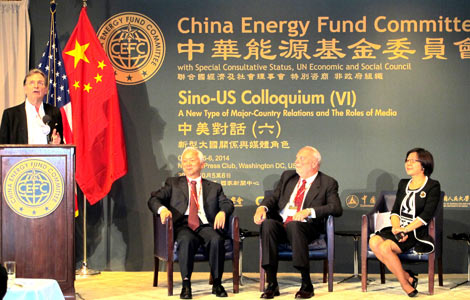Chinese tech giants pump up US startups
Updated: 2014-10-08 11:55
By Lian Zi in San Francisco(China Daily USA)
|
||||||||
The trio of Chinese Internet giants Baidu, Alibaba and Tencent are finding that investing in startups is a smoother way to enter US markets.
"There have been 52 investments made by Chinese companies in the US from 2012 through August 2014, at an investment total of $3.6 billion," Rebecca Fannin, founder and author of Silicon Dragon, told China Daily.
"BAT [an acronym for the trio] companies are looking to expand in the US, and buying startups with the ample cash they have is a good way for them to enter the market," Fannin said.
The companies typically invest in tech startups primarily in the mobile, gaming and e-commerce markets. That also eases entry for US startups into China's markets, Finnin said.
Alibaba Group, coming off a wildly successful IPO, began investing in US startups last year.
American investors and venture capitalists were surprised by Alibaba's market capitalization, said Hans Tung, managing partner of GGV, during a panel discussion at Silicon Dragon Valley 2014 last week.
"Although Alibaba didn't spend lots of time talking about their investment in the US, the company is quietly finding opportunities to participate in different parts of the US market," said Eric Savitz, partner of Brunswick Group, a US-based public relations firm that supported Alibaba on communications as it prepared to file for its initial public offering.
Savitz said the startup investments are a way for Alibaba to expand its US business without directly competing with American tech giants such as Amazon and eBay.
The company 1stdibs, a New York-based marketplace for luxury goods, was the first investment announced by Alibaba in 2014. In total, 1stdibs got $15 million in series C funding from Alibaba.
In March, Alibaba invested $215 million in Tango, a California-based messaging and free-calling app company.
In April, Alibaba participated in a $250 million round of series D funding for Lyft, a transportation network company in San Francisco. (Series C and D refer to stages in the venture capital funding process.)
In June, Alibaba helped finance Peel, a California-based, TV-control app maker. Although the amount of funding was not disclosed, business insiders said that it was more than the previous round, which was about $5 million.
In July, Alibaba put $120 million into Kabam, a video game start-up that is now worth more than $1 billion. Kabam's games could be distributed across Alibaba's mobile apps.
While Alibaba's investment activity started only last year, Tencent has completed more than 15 deals over the past three years, according to CB insights.
Tencent Holdings participated in Fab.com's $150 million funding deal. Lately, Tencent has been investing more at the seed stage in startups focused on the consumer mobile space. Tencent-backed mobile companies include Everyme, Loom, "Quiz Up" developer Plain Vanilla Games, Whisper and Snapchat, reports CB Insights.
In 2013, Baidu acquired mobile safety firm TrustGo for $30 million.
Finnin said that it is too early to gauge the success of the "BAT" trio's investments. "Besides, this is not a typical venture capitalist investment looking primarily for a return, but a strategic investment," she said.
Compared with Google and other American companies that invest in businesses not necessarily related to their own, the "BAT" trio focus more on technology required by their current business or for expansion, said Wang Xiao, CEO of Innospring.
For example, when Alibaba invested in Tango, which has more than 200 million registered users, it wanted to expand its own messaging services to compete with Tencent's Wechat, which has slowly morphed into an e-commerce platform.
zilian@chinadailyusa.com
(China Daily USA 10/08/2014 page2)

 Silent HK majority urged to support government
Silent HK majority urged to support government
 Lunar eclipse in Asia and the Americas
Lunar eclipse in Asia and the Americas
 Hot air balloon challenge in Wuhan
Hot air balloon challenge in Wuhan
 Cultural bridge key for China, US
Cultural bridge key for China, US
 Romance at the West Lake
Romance at the West Lake
 Traffic embraces busiest day for holiday week
Traffic embraces busiest day for holiday week
 Chinese tourists flock to US for Golden Week
Chinese tourists flock to US for Golden Week
 Chinese insurer buys NYC's Waldorf Astoria Hotel
Chinese insurer buys NYC's Waldorf Astoria Hotel
Most Viewed
Editor's Picks

|

|

|

|

|

|
Today's Top News
Hopes for US, China trade high: experts
Xinjiang Corps to step up fight against evil forces
US Commerce to help tap Chinese market
Chinese tech giants pump up US startups
Chinese soldiers join exercises with Australia, US
Insurance group buys the Waldorf
Chinese having babies from abroad
A concrete step forward to mend ties
US Weekly

|

|







